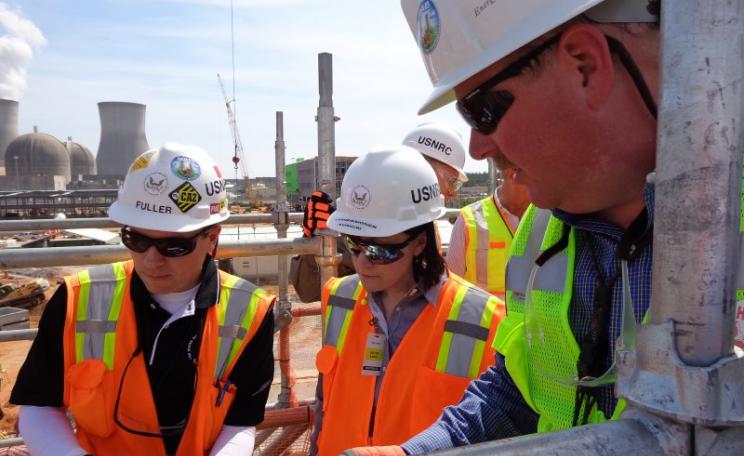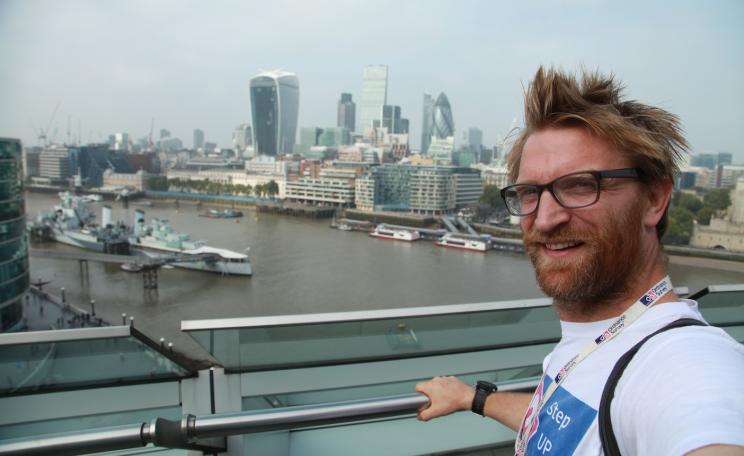Want to be a true revolutionary? Rip up the paving slabs, plant a garden, and cover your roof in solar panels.
We met only one minute ago, he's not yet unclipped his cycle helmet, but community entrepreneur Agamemnon Otero has already seized my Dictaphone from the table, and is talking into it like it's a microphone:
"Resilient, healthy communities make empowered cities", his words delivered slow and clear into the top of the recorder.
"Resilience comes from giving individuals control. Communities have the skills they need to achieve this. But they need an idea to work around, and a vehicle to deliver it."
Tackling fuel poverty with renewables
It is just weeks before Repowering London, the not-for-profit co-operative he runs, launches its latest community-owned renewable energy project - an initiative to help deprived Londoners tackle fuel poverty.
This game plan has mayor Boris Johnson and secretary of state for energy and climate change, Edward Davey paying full attention. And it's no surprise.
His bombastic arrival - up on this solar panel clad rooftop café in Hackney - is characteristic of this 37-year old - pioneer of Brixton's Edible Bus Stop and Energy Garden, and a twice survivor of cancer.
"If you want to be Che Guevara, stop walking around pointing to what's bad", he says, with gestures as passionate as his tone of voice.
"Want to be a true revolutionary? Rip up the paving slabs, plant a garden, and cover your roof in solar panels. At Repowering London our ethos is 'be the change you want to see in the world'."
Solar communities
Community-owned solar panels are the weapon in the not-for-profit's battle for energy security. And community co-ops are the armies it is amassing to wield them.
Five co-ops have been set-up by the organisation in the two years, installing 132kW of panels across Lambeth. And this month, fundraising for its newest vehicle, Hackney's Banister House Estate begins.
"One hundred and sixty people in Lambeth die every year due to fuel poverty", he tells me with fury. Then states with disbelief: "Estates are losing people because they are cold."
Cold. And without opportunity: the other entrenched enemy on low-income London estates. But since social housing blocks offer the large roofs that make solar generation financially viable, funds made from this clean electricity is utilized to create jobs and training.
Not that he can solve all of London's problems ...
Agamemnon pours me a cup of tea, and takes me back to October 2012, to the morning of the second installation on Brixton's Loughborough Estate. Walking onto site that day, he arrived to find crowds gathered behind police tape: three girls and a boy had fatally stabbed another girl.
"I had four lorry loads of solar panels, two cranes and 14 interns coming to do the installation", he recalls. "I began to shake: the national policy was about to change because it had been decided renewable energy was getting too much subsidy. We had to turn those solar panels on."
Want to be a true revolutionary? Rip up the paving slabs, plant a garden, and cover your roof in solar panels.
Determined, Agamemnon jumped two police cordons, pushed past a policeman and ran to the door of Misha, the mother of one of the girls interning for Repowering London.
He called: "Misha, it's Agamemnon, the guy from the co-op. We are here to set up the energy project."
'No one ever comes through for us'
With no response to his plea, a fraught Agamemnon leaned back against her door and looked across to the chalk mark describing where the dead girl's body had lay. Seeing it, he realised retreat was not an option.
"I shouted through the door: 'those children are in the same class as the girls working on the internship'."
Misha opened the door and said: "When you did the first project, I didn't believe it could happen again. No one ever comes through for us. But you're here now."
That day, the co-op installed 180 solar panels across five roofs on the estate. But Agamemnon's pride was quickly leveled.
"Once we finished I sat there and proclaimed: 'we can give these kids a way out'. Then a women in our group tapped me on my shoulder and said: 'Our children don't need a way out - they need a way into society. They need to feel they're a supported part of the system'."
Creating opportunties
Education and employment opportunities are therefore at the heart of the mission on supported estates - projects funded by co-ops set up with money from people living on estates, or nearby. Paid 30-week internships provide training in energy audits, communication skills and solar panel installation.
Although it's too expensive to arrange for panels to supply flats direct, some electricity powers communal spaces, helping lower residents' bills. The sale of the rest to the National Grid generates profits for the co-op, which funds paid placements, as well as draught-proofing works, retrofitting and home energy audits.
This cash comes from a ring-fenced social fund that pools 20% of the annual profits made from the sale of electricity generated. After that's secured, each co-op investor personally draws a 4% annual return from those profits.
During its first project on the Loughborough Estate, when a 37kWp rooftop solar power station was installed, £58,000 was raised to establish the co-op in less than a month, and from 103 people living in the surrounding Lambeth borough.
Empowerment, jobs, fuel security
A share in the Banister House co-op is open to all. But like the sister schemes in South West London, no matter what amount you invest, you're entitled to just one vote: while shares cost £50 for estate residents they are £250 for outsiders. These rules ensure control for the whole community.
An MA graduate in architecture, advanced environment and energy, Agamemnon's early career overseeing renewable energy projects at a bank and renewable energy trading company proved financial markets could be manipulated around social aims.
"I'd oversee vehicles that would attract big investors and deliver big returns", he explains. "But these structures weren't offering empowerment, jobs or fuel security."
To him, these sustainable initiatives operated as mere replicas of the 'Big 6' energy suppliers. To really effect change, Agamemnon realised, funding must come from local communities, and profits must remain where they're generated.
'Even the politicians want a new system'
It's a model that has won Agamemnon - who lives in an old North Sea fishing trawler in Vauxhall - a seat on Johnson's green entrepreneurship scheme, London Leaders, and the Department for Energy and Climate Change Community Energy Contact Group.
While he's well aware that "ninety one percent of global capital is tied to fossil fuels, that these huge juggernauts are what are pressing policy forward" he also has faith these connections will help win on the political battlefield:
"Edward Davey supports the idea. He wants to take it nation-wide. Even the politicians want a new system.
"It isn't about boycotting. It's about presenting the right people with a cohesive argument and tangible examples. And if they don't listen the first time, you go back and put it in front of them again."
On seeing the project's achievements in Brixton, Hackney Council invited Repowering London earlier this year to scope out the troubled Banister House Estate. "We proved it can work and we can deliver it."
The real challenge is to engage communities
While low-income areas are Repowering's current focus, this is a model Agamemnon sees being rolled out to anywhere there's a strong community group in place.
Winning councils over is one challenge. Gaining trust from the community itself is another. "It is the hardest part", Agamemnon admits, as we leave the café for Banister House, around the corner.
"But we've learned so much - about how much these groups need, how positive the impacts can be but also, what's at stake if something doesn't come off."
A six-month engagement process on site to scope what those needs are, and to rally support for solar panels means open meetings and door knocking, "not pushing leaflets through letterboxes".
At Banister House, Repowering pays its young interns to learn about the finance, IT, technical and legal aspects of an energy coop, and about energy efficiency. This way they "become the greatest advocates" when communicating with residents.
Building a neighbourhood
Here in Hackney they have found an overwhelming support. Three residents of the Estate have agreed to be co-op directors and 73 households want to invest.
As we walk around the housing blocks we bump into Stuart Grean a director of the co-op, outside his flat. He sees the solar panels' as a much-needed sustainable energy source, but says the big win is it is knitting the community closer:
"People used to keep themselves to themselves but the meetings are building a neighbourhood."
And there are personal achievements, too. Kevin, a long-term unemployed man from the Loughborough Estate moved from a paid internship with Repowering London to a job as a liaison officer for an energy efficiency contractor on site.
The way is hard, but the rewards are great
Then there's teen Kemal, from a single parent family living on the Roupell Park Estate. He graduated from Repowering's work experience scheme to find a full apprenticeship and employment with construction firm Costain Group.
"When he met him, his house was so cold the family could not use two rooms because of the poor insulation. And as his mum had to work full time, Kamal was taking care of his handicapped sibling."
But with a little guidance from the Repowering on Brixton Energy Solar 3 co-op, the teenager thrived. "He was smart. He has made his own way. All he needed was support in the beginning."
Kemal used some of the wages Repowering paid him to invest back into the co-op. Forget the politicians: this is a strategy for change that clearly makes sense to the really important people.
Lucy Anna Scott is a nature writer and co-creator of Lost in London magazine.
More information:
- Repowering London website.
- Agamemnon Otero on YouTube - Community Energy Conference 2013,13 minutes.






